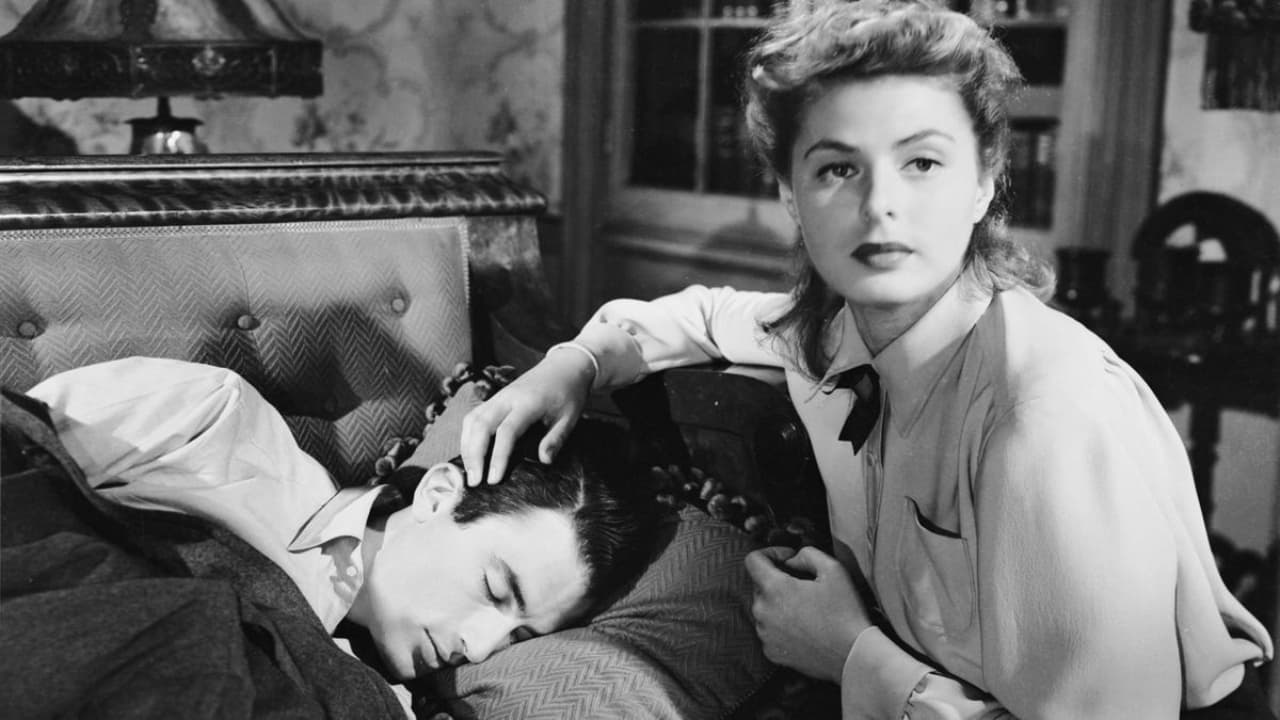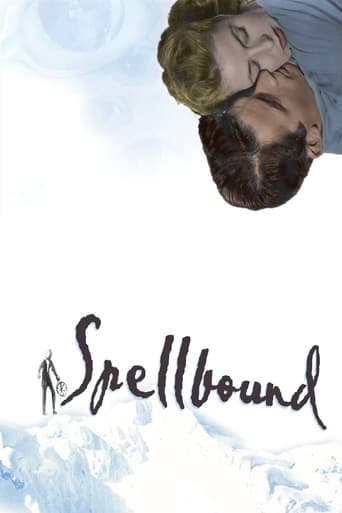

ridiculous rating
... View MoreEntertaining from beginning to end, it maintains the spirit of the franchise while establishing it's own seal with a fun cast
... View MoreEasily the biggest piece of Right wing non sense propaganda I ever saw.
... View MoreIt is neither dumb nor smart enough to be fun, and spends way too much time with its boring human characters.
... View MoreTo me this was NOT one of the more impressive moves by Alfred Hitchcock and it is Alfred Hitchcock Mannerism that gets in the way that reduces the film to silliness. The musical score is overbearing while Gregory Peck and Ingrid Bergman are under bearing. The notion of Freud seems more fraudulent about psychology than reflective of any psychological reality.But the most powerful defect goes to a portentous and pretentious musical score that announces itself.When you look at the best of Hitchcock (Dial M for Murder, Rebeca, the 39 Steps, The Man who Knew Too Much, ) the story line succeeds in pulling the Hitchcock mannerisms forward without reducing the film to silliness. There must always be a sense of plausibility to a film, "Well, it could happen, now couldn't it?" Even "ET, the Extra Terrestrial" succeeds for this very element of plausibility. Somehow with this, Hitchcock here failed in that most basic element of story telling; it all seemed a stretch. I never understand the adulation for Hitchcock. When he tells a good story he is excellent; when Hitchcock himself gets in the way of the story, the story suffers.
... View MoreIn general, I don't like Alfred Hitchcock's movies, and I tend to avoid watching them whenever possible. Spellbound, however, is the exception. It is my favorite Hitchcock movie, with an interesting psychological story, great acting, a beautiful Oscar winning theme from Miklos Rozsa, a strange but interesting dream sequence designed by Salvatore Dali, and a well-paced mystery.Ingrid Bergman plays a psychologist in a clinic, and while she's very well liked among the staff and her patients, she has no love in her life. She's pursued, but always declines. A new doctor joins the staff, and since it's a very young, very handsome Gregory Peck, Ingrid falls in love. But is he hiding something? Usually, I find Hitchcock's movies slow and boring. Maybe I like Spellbound so much because the always-present psychological mystery actually correlates to the setting of the story. The main characters are psychologists, so it makes sense that they would want to dig deep in the psychosis and analysis of people's problems. Whatever the reason, I really love this story and the way it's played out for the audience. Both leads give heartfelt performances, and one of Ingrid Bergman's lines has become a household phrase in my home. A patient starts having a meltdown in a very public place, and Ingrid says to him, "Pull yourself together!" What a terrible doctor! I just find that line hilarious.
... View MoreDr. Constance Petersen (Ingrid Bergman) is a psychiatrist at Green Manors mental asylum. The head of Green Manors has just been replaced, with his replacement being the renowned Dr. Anthony Edwardes (Gregory Peck). Romance blossoms between Dr. Petersen and Dr. Edwards but Dr. Edwards starts to show odd aversions and personality traits. It is discovered that he is an impostor, and amnesiac, and may have killed the real Dr. Edwardes. Dr. Petersen is determined to discover the truth through unlocking the secrets held in the impostor's mind, a process which potentially puts her and others' lives at risk.Superb psychological drama, and a movie that could only have been directed by one man, Alfred Hitchcock. Clever, tense plot that gives out information in a trickle, making it all the more intriguing and unpredictable. The psychological aspect seems well researched and accurate (though I'm no student of psychology), making it all the more realistic and convincing.Great work by Ingrid Bergman and Gregory Peck in the lead roles. The chemistry between them is wonderful and Bergman is mesmerisingly, can't-take-your-eyes-off-the-screen beautiful. This was only Peck's fourth movie (though he already had an Oscar nomination behind his name, thanks to his second film, The Keys Of The Kingdom).Adding to this is the work of Michael Chekhov who gives a fantastic performance as Dr. Brulov. Blunt, funny and the perfect complement to the seriousness of Bergman and Peck. Chekhov received a Best Supporting Actor Oscar nomination for his performance.
... View MoreAlong with its obvious echoes of the style the master of suspense was so renowned for, SPELLBOUND is a slightly different movie of his. Except for the Expressionistic character of Hitchcock's movies both in their visual schemes and thematic concerns, it is a "tale of psychiatry, love and murder" (Robert Snow). Bearing this in mind, we might quote Francois Truffaut who said about the director that he "gets the maximum effect from the minimum elements." This maximum effect in SPELLBOUND finds its fullest realization in its psychoanalysis, a true novelty for the 1940s.The psychoanalysis here, as dated as it may seem, occurs to symbolize a particularly modern approach not only to the screen adaptation of a literary piece (the film is based upon a 1927 novel THE HOUSE OF DR EDWARDES by Hilary Saint George Saunders and John Palmer) but primarily to addressing of the versatile needs and expectations of its viewers. Certain dated visuals do not, indeed, shadow the dynamic effect of appeal, understanding, interest that the movie still instills after all these decades. All its artistic equipment, including the terrific soundtrack by Miklos Rozsa (not Bergman) known for the instrument of theremin, brilliant details of images, namely the opening doors that appear to symbolize the opening of hidden worlds of characters in a totally new, yet undiscovered manner (Selznick's idea), the ultra-popular dream sequence designed by Salvador Dali (I will mention later) constitute the great merit of the film and its director who could "infuse the simple story with compelling camera work and great pacing that keeps us guessing until the final pieces drop into place" (Robert Snow). However, the major strength of SPELLBOUND lies elsewhere...Carter B Horsley in one of his reviews on Hitchcock's films stated memorably that the Master of Suspense could boast three major points: "immense influence, sardonic and mischievous with and the magnetism of his cast." The two first points would never exist without the last one, that is the leading and supporting cast who make SPELLBOUND a true feat of acing.As the story imprisons its characters within the spheres of psychoanalytical approach which reinforces the duality of human nature, the actors deserve full credit. Ingrid Bergman as Constance Petersen and Gregory Peck as John Ballatyne) make a brilliant couple of a doctor and her patient developing various emotions and feelings that come and go in their growing relationship. With certain liberties taken with its original literary source and highly adapted to the medium needs by Ben Hecht, the cast supply us with an authentic insight into situations and states of mind therein depicted. As the story develops 'emotional problems of the sane,' (which we read at the beginning), they handle the task to prompt the audience to psychoanalyze the characters. Of course, we, supplied already with incomparable experience within that field after years of its popularity, do that differently than viewers of the 1940s did that. Anyway, that inspiration still works. Roger Ebert rightly pointed out about Ingrid Bergman that she "subtly combined the noble and the carnal" Some of the very best moments of theirs include the railway station moment, the kiss, Peck's first entrance and the visit at Dr Alexander Brulov's played magnificently by Michael Checkov. With his weird English accent and his cutting remarks, he makes for supreme wit and thrill as well as adds clever intellectual resonance to the story.The minor point of criticism might refer to the skiing sequence which surely occurs dates and a bit laughable and the performance of Leo G. Caroll as Dr Murchison who, on the one hand, does not call our attention on the true villain (and rightly so) but, on the other hand, becomes a bit too suspicious with his forged respectability, calmness and conventionality.Something needs to be mentioned about Dali sequence. Initially planned as a 22 minute sequence and finally cut to 2 minutes, it is still the most intriguing, nightmarish, mysterious almost part of the movie that is impossible to be skipped. Robert Snow rightly calls it 'cool' stating further that "the backgrounds have that stark, painted quality of Dali's surrealist works." Much more could be said about this excellent movie but the word limit, unfortunately, does not allow that. Putting it in a nutshell, it is one of a little less famous Hitchcock but, surely, highly worth seeing as a tremendous depiction of any sane man put behind bars of guilt complex.
... View More